 Petzlover
Petzlover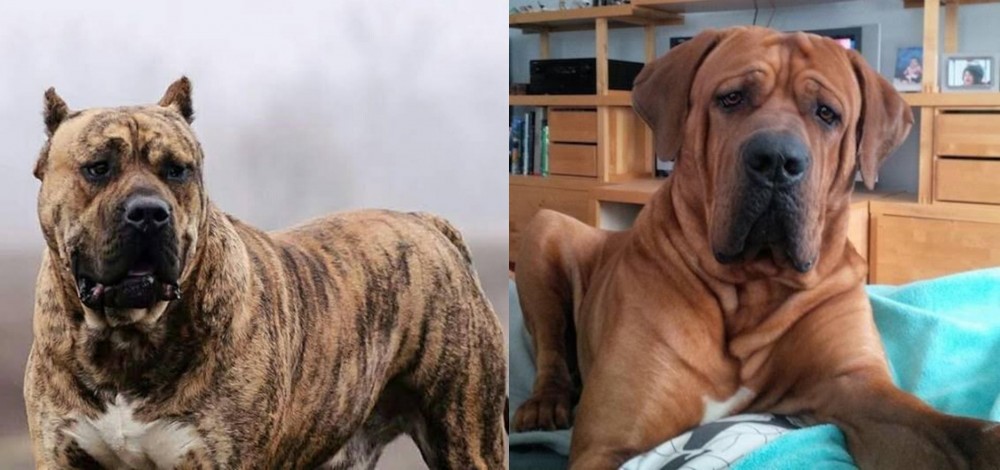 Perro de Presa Canario is originated from Spain but Tosa is originated from Japan. Perro de Presa Canario may grow 16 cm / 6 inches shorter than Tosa. Perro de Presa Canario may weigh 20 kg / 44 pounds lesser than Tosa. Both Perro de Presa Canario and Tosa has same life span. Both Perro de Presa Canario and Tosa has almost same litter size. Both Perro de Presa Canario and Tosa requires Low Maintenance.
Perro de Presa Canario is originated from Spain but Tosa is originated from Japan. Perro de Presa Canario may grow 16 cm / 6 inches shorter than Tosa. Perro de Presa Canario may weigh 20 kg / 44 pounds lesser than Tosa. Both Perro de Presa Canario and Tosa has same life span. Both Perro de Presa Canario and Tosa has almost same litter size. Both Perro de Presa Canario and Tosa requires Low Maintenance.
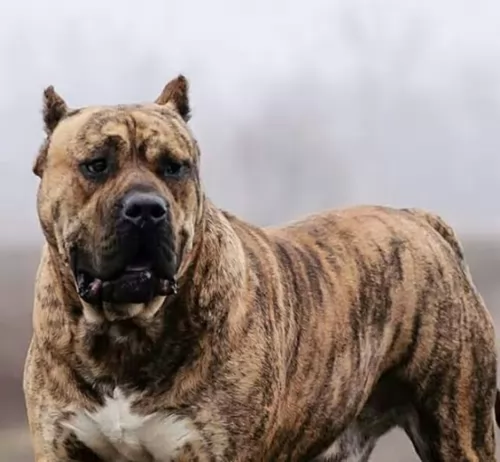 This large dog, also known as the Canary Mastiff, is a rare Molosser-type dog hailing from the Canary Islands.
This large dog, also known as the Canary Mastiff, is a rare Molosser-type dog hailing from the Canary Islands.
It does appear as if, according to records, that these dogs were also consumed at one time. The dog has also been used as a cattle dog as well as being used for dog fighting till the middle of the 1900s. Dog fighting was prohibited in the 1940s but it continued for a number of decades.
As people became interested in other dog breeds, the Presa nearly died out but some breeders revived the breed because of it having some good characteristics – territorial, brave, protective and intelligent. The FCI recognized the dog in 2011.
 Known also as the Japanese Mastiff, the Tosa hails from Japan. In fact, these dogs come from the Tosa Province, so the dog was named after the region where they were bred.
Known also as the Japanese Mastiff, the Tosa hails from Japan. In fact, these dogs come from the Tosa Province, so the dog was named after the region where they were bred.
It is why they are sometimes referred to as Japanese Mastiffs. The Tosa is a rare dog breed and unfortunately, the dog is still used in Japan for dogfighting.
The breed was developed in the 2nd half of the 19th century, with a number of dog breeds being involved to bring about a more powerful, braver dog.
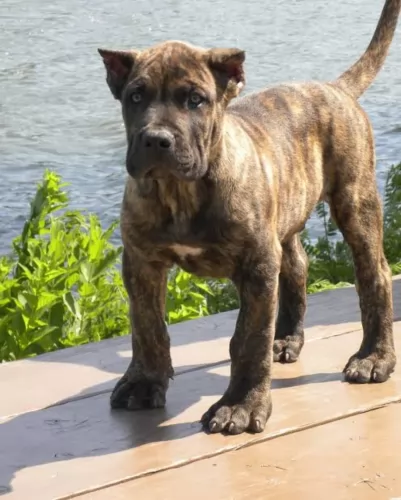 The Perro de Presa Canario or Canary Dog is large and muscular. He stands at 58 to 66cm in height and weighs anything from 40 – 70kg. He has a deep bark.
The Perro de Presa Canario or Canary Dog is large and muscular. He stands at 58 to 66cm in height and weighs anything from 40 – 70kg. He has a deep bark.
The head is broad and the ears are normally cropped to give him a more aggressive appearance. With ear cropping being banned the ears are close fitting to the head and are floppy. This is one of those dogs where the rear of the dog is slightly higher than the shoulders.
The coat is short and there is no undercoating. It is available in all different shades of fawn and brindle. The breed standard requires the dog having a black mask.
Canine experts tell us that this large working dog has got such fearless guardian characteristics that they wouldn’t recommend this dog for first time dog owners. On the other hand however, there are dog owners who claim that with good socialization, this dog becomes docile and amicable around their human family.
He is a clever dog so training and socialization will be easy and it will be worth it. This is a dog noted for its strength, it’s strong personality and potential for aggression, so training and socialization will be most important.
 The Tosa is a large dog, but their sizes vary, and in fact, because of their fighting, they are actually divided into light-, middleweight and heavyweight classes.
The Tosa is a large dog, but their sizes vary, and in fact, because of their fighting, they are actually divided into light-, middleweight and heavyweight classes.
Generally, you can say that these dogs weigh in the region of 54 to 90kg and they stand in height at between 62 to 82cm. The head is large, the jaws powerful, the eyes dark brown in color, the ears small, high set and floppy.
The neck is broad wit a dewlap and the tail is long, thick and tapering to a point. The coat is short and thick and is most times a rich caramel color, fawn tan, black or brindle. The dog often has a black mask.
The Tosa is a fairly quiet dog, courageous and fearless. He is going to need a strong, consistent owner who shows leadership with him. Training and socialization will be imperative for this dog.
When he has been properly reared and trained, he makes a good pet, able to get on with members of the family. He takes his role as protector and guardian seriously.
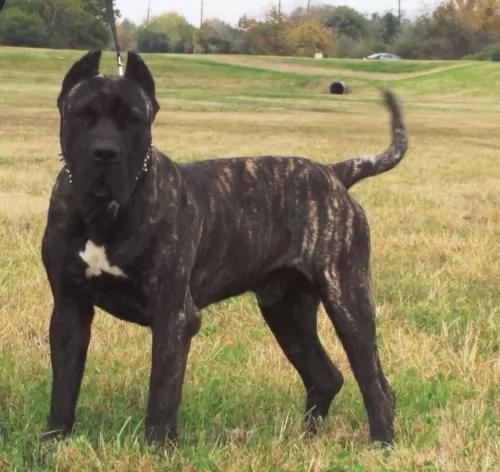 Contrary to what many people think, the Perro de Presa Canario can be a calm, gentle dog when trained and socialized properly.
Contrary to what many people think, the Perro de Presa Canario can be a calm, gentle dog when trained and socialized properly.
It is only when you bring an older, unknown dog into your midst that you would have to exercise caution with him as he can then be aggressive.
Dogs become dangerous and aggressive when they are brought up by aggressive, uncaring people. Humans are always to blame for the way a dog turns out. Provide this large dog with a loving, caring home, and he’ll show you what a remarkable pet he can be.
 The Tosa isn’t recommended for first-time dog owners, as in the wrong hands, they can become aggressive. Care has to be taken around children too especially undisciplined ones.
The Tosa isn’t recommended for first-time dog owners, as in the wrong hands, they can become aggressive. Care has to be taken around children too especially undisciplined ones.
He also doesn't come as recommended for small, cramped homes in the city. He’s just too big and he will need to get out and be walked often.
You want to create a home for him that ensures he is the calm, gentle dog he is capable of being, If you’re fair, firm, caring, patient and consistent, then this big dog might be for you. With the right care he becomes a gentle, devoted pet.
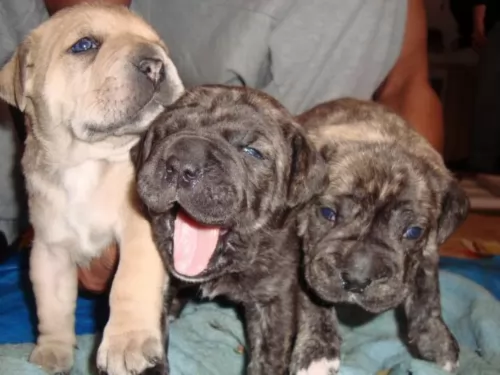 The Perro de Presa Canario can live to be between 8 and 12 years of age. Being a large breed the dog can be susceptible to hip dysplasia and other problems such as cancer and heart problems. It is highly unlikely that a well cared for dog will get any of these illnesses.
The Perro de Presa Canario can live to be between 8 and 12 years of age. Being a large breed the dog can be susceptible to hip dysplasia and other problems such as cancer and heart problems. It is highly unlikely that a well cared for dog will get any of these illnesses.
It is far better to give your dog two smaller meals a day as opposed to one bigger meal as then he tends to wolf his food down. This can lead to bloat, where the stomach swells up and worse, it twists. This dangerous situation prevents fluid and air from escaping the stomach. Your dog is restless, he paces and salivates, wanting to vomit. Bloat can affect any dog at any age.
Kidney disease can develop because of some other illness or it can develop on its own. It can even be caused by bad teeth when bacteria enters the bloodstream of the dog.
 The Tosa is a formidable looking molossoid, but even so, this big, calm dog can succumb to illness. Some of these diseases you need to be looking out for include bloat,hip dyslasia and eye conditions.
The Tosa is a formidable looking molossoid, but even so, this big, calm dog can succumb to illness. Some of these diseases you need to be looking out for include bloat,hip dyslasia and eye conditions.
Bloat for this dog can be life-threatening, and can often be because the dog is too hungry and he gobbles up his food quickly. Bloat is when gas can't escape, the stomach swells and twists – very dangerous. Rather give your dog two smaller meals – one in the morning and one in the evening, or even give several smaller portions throughout the day.
To help with eliminating health issues always choose a reputable Tosa breeder. You’re not likely to find one of these dogs in a dog shelter.
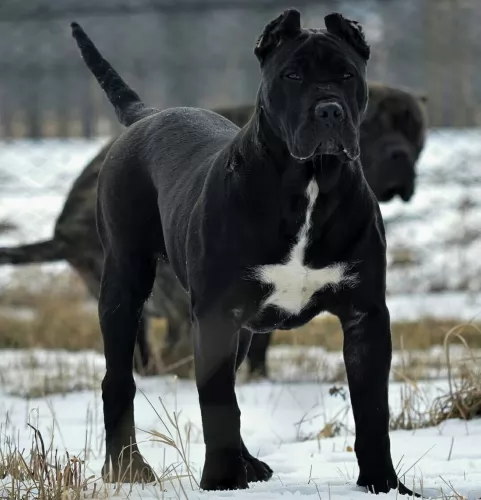 This is a short haired dog, and he isn't a heavy shedder so beyond regular twice-a-week brushing he will simply need to have his eyes and ears checked for infections.
This is a short haired dog, and he isn't a heavy shedder so beyond regular twice-a-week brushing he will simply need to have his eyes and ears checked for infections.
He will also need to have his nails clipped and to check his teeth over too. A sore, bad tooth at the back of your pet’s mouth can cause terrible pain but also play havoc with his general health.
Your Perro de Presa Canario is a high-energy dog and he will need daily exercise. He will love a good walk but he will also need something more strenuous and demanding such as ball- and rope tug-of-war games.
Try and provide your large pet with a top quality commercially manufactured food – one that is packed with vitamins and minerals instead of colorants preservatives and toxic fillers.
Break the monotony of feeding him only kibble by mixing in some cooked chicken, brown rice, sweet potato, carrots and spinach. Dogs love consistency and simplicity and simple meals like this with some raw meat thrown in occasionally will keep him healthy and happy. Never leave him without a constant supply of fresh, cool water.
 These large, strong dogs do well on good quality food. If you opt to buy him commercially manufactured food, make sure it is the top quality one free of unwholesome ingredients such as preservatives, colorants and useless fillers.
These large, strong dogs do well on good quality food. If you opt to buy him commercially manufactured food, make sure it is the top quality one free of unwholesome ingredients such as preservatives, colorants and useless fillers.
Invest in the best quality ones that have nutritious minerals and vitamins. Try and give your dog some home-prepared food too – boiled chicken, brown rice or pasta, spinach, sweet-potatoes and carrots.
Never feed your dog things such as chocolates, peanuts, crisps, grapes, onion and food with spicy flavorings. This will just ensure digestive problems and having to get your dog to the vet.
The Tosa’s short coat isn’t going to require too much attention. A good brush twice a week will keep it free from loose hair and keep its shine and gleam. It’s why the dog is looked upon as being low maintenance.
Beyond that, he will need to have his nails trimmed. When brushing him, check him over for parasites – ticks and fleas, check for unusual lumps and look inside his ears for signs of redness.
These dogs are calm and fairly low-energy. Nonetheless, to maintain good health, he will need to be exercised. Ball games outside are always a good idea as well as nice long walks. Hikes into the countryside will be wonderful for this big dog.